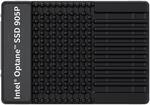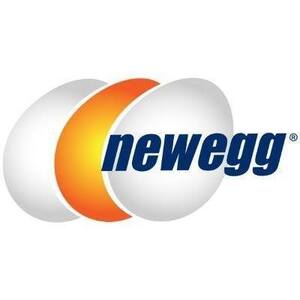Worlds fastest SSD, iykyk, not for everyone but since these are going out of production soon and this is the best price I've seen in a while. Don't expect nand based ssds to catch up for a while. 17,500 TBW Endurance
Intel Optane 905P Series 960GB 3D-Xpoint SSD $701.70 Delivered @ Newegg
Related Stores
closed Comments

It is in terms of random reads and random writes which usually matter a lot more than sequential

Seen the random r/w for a Samsung 990 PRO? Nearly double.

Compare it on a queue depth of 1 and you'd see a massive margin the other way
Bascially its like comparing multithread vs single thread CPUs
NAND SSDs can be massively paralel, but the time to retrieve a single bit on Optane is insanely fast vs any other tech
Not something you'd notice in most applications but databases scream on these
So true, not fastest outright, but fastest for low queue depth workloads

@Tigerhacker: It's a shame Optane got shut down, they really had some amazing technology here, it's sad it couldn't become more affordable.

@KARMAAA: I love them, have 2x 480GBs from years ago, realy sad its dead, was reeealy looking forwards to getting some pcie4 drives and them upping the number of chips to get faster total throughput
just picked this up, need something a bit bigger for a boot drive for a while (with a massive pagefile + hibernation file, i put some serious drive writes on these drives)
Now I can finally give my 'server' some Optante :P

@Tigerhacker: I wish we got to see pcie 4/5 versions of these :(, those would have absolutely killed in performance

@Kazusa: Yeah, sadly its suuuper niche and it doesent have the big wow factor in a lot of benchmarks
It doesn't help that most applications wont show much performance gains once you hit mid tier pcie3 drives or even high end SATA SSDs
oh and that only Intel makes it so theres no compeition (granted its their tech)

@Tigerhacker: @Tigerhacker @Kazusa There is a pcie 4 version of this drive it’s just fkn 4grand or so.
“ Intel Optane DC P5800X Series ”

@ShrewdBargin: I've seen it, its not a huge upgrade, its mainly incremental gains and an interface upgrade IMO
And its eye wateringly expensive 😬

@ShrewdBargin: Oooh, its quite a bit faster than i recall it being, sill not ready to drop $4K+ on it :P
Was hoping to maybe some used P5800X drives in a few yers when tehy start getting decomissioned especially since drive writes isnt a concern here

Tell me you don't know more than surface depth about SSDs without telling me

"Optimize for write intensive workloads."
Servers with disk cache is the real use case for theses .. not home gaming PC's

Interesting. That memory on an nvme would rule. No more crappy speeds after the cache is exhausted!

Only real non-business usecase I've seen for these is for ZFS caches. But that'd be the low capacity optane drives.

To anyone seeing this post. Please do not buy these drives unless you know what you are doing and have a specific use case for them

Yeah, as much these are awesome tech, theres really no point in getting these unless you plan on taking advantage of its specific strengths
Im not sure if theres point to 8GB/s drives for most workloads either but thats a different story XD

I'm guessing this is all SLC?

Complete different tech to NAND

Kind of, except it is better than SLC. The key performance advantage of 3D XPoint is 4K random read at queue depth 1. 4K random read queue depth 1 is something SSD cannot cheat. Current flagship PCIe gen 4 can only go up to 85MB/s for 4K random write QD1, but 3D Xpoint is 275MB/s.
Another significant advantage is low latency.
However, it has three issues. (1) SSDs cost less and can easily 'cheat' in sequential read/write and (2) While 3D Xpoint's 4K random read QD1 is impressive, it cannot beat RAM so programs are still going to try to use RAM. (3) Cost / price.
It is great, but it is an overkill for most of us. It suffers the same issue as PCIe gen 4 SSDs, as in they don't run much faster in games (because game developers will still favour RAM). 3D XPoint is not designed to beat SSD in sequential read/write.

Please note this eats power quickly. Not good for laptops.
Power - Active 10.8W
Power - Write14.8W
Power - Idle 6W
Good point, but this thing uses a U.2 interface so it is quite unlikely a laptop would have that.

Would not fit in a laptop anyway.

Look at the storage configuration on your motherboard first if you have U.2 interface.
https://www.delock.com/infothek/U.2-NVMe/u2-nvme_e.htmlU.2 adaptor and cable are not very cheap.
Persoanlly I think it is way too overkill for daily computing need. Unless you use it for a commercial level server.
If your motherboard/server do have U.2 interface, probally it is worth giving it a go. Otherwise, using U.2 SSD with cheap adaptor & cable looks weird.

Delock products are generally at rip off prices. They are only suitable for businesses where you can expense them. You could get cheap adapters from AliExpress, but this U.2 form factor is a bit annoying so you will still need to use an appropriate PCIe slot.
That's another problem, PCIe gen 4 x4 slot. You need a decent, and relatively new motherboard. B550 is out, so is B660, even H670 is unsafe.
Too expensive, not practical for home use. Anyone serious about gaming would rather use that money towards a better graphics card. Being able to load a game 0.5 or 1 second faster is useless if the fps is rubbish.

this one has a adapter cable included

Moved Windows to a 900p a few years back (after MSY had a crazy deal on a few they had left) in my 6700K system, PCI-E x4 direct to CPU (so not disadvantaged vs my NVMe SSD).
For general use (OS, web browsing, office apps, games, etc.), couldn't really tell the difference between the 900p and my 960 Pro, even though benchmarks confirmed the former was like four times faster at low queue depth 4K random reads. Feedback from others was mixed - some claimed it made Windows much snappier (which is what attracted me to it in the first place) while others said it made no difference.
Can't account for that inconsistent feedback, but I don't think there was objective evidence of a real world impact for that sort of use (like app startup being measured at 1 second instead of 2 seconds, for example). From what I've seen in testing by Level1Techs etc., it's in specialised use cases like databases where it can be demonstrated to really make a difference.

Yeah, the main issue is how exactly you take advantage of the 4K Q1 random read. You need a situation where you force a program to do a lot of 4K (small files) random reads at low queue depth. The most common scenario is database.
The fundamental problem is, while 3D X-Point is great, developers still much prefer RAM (which still has way better 4K Q1 random read compared to 3D X-Point). So, it doesn't make sense to not use the best / right memory type and opted for the second best. Another issue is that at high queue depth, SSD caught up quite quickly on 4K random reads, making it hard for 3D X-Point to shine consistently in every server environment. The windows bootup could be 1 or 2 seconds faster, but the issue is SSD performance is not that slow. PCIe gen 4 SSDs are facing a similar issue. Hard to feel the improvement except in benchmarks and certain scenarios (which are generally not very practical).


Not even close to fastest SSD.